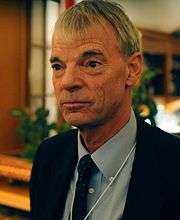Michael Spence
| Michael Spence | |
|---|---|
 | |
| Born |
November 7, 1943 Montclair, New Jersey, USA |
| Nationality | United States |
| Institution |
Harvard University Stanford University SDA Bocconi School of Management New York University |
| Field | Microeconomics, labor economics |
| Alma mater |
Harvard University, (Ph.D.) University of Oxford, (B.A.) Princeton University, (B.A.) |
| Doctoral advisor |
Kenneth Arrow[1] Thomas Schelling[1] |
| Influences | Richard Zeckhauser |
| Contributions | Signaling theory |
| Awards |
John Bates Clark Medal (1981) Nobel Memorial Prize in Economics (2001) |
| Information at IDEAS / RePEc | |
Andrew Michael Spence (born November 7, 1943, Montclair, New Jersey) is an American economist and recipient of the 2001 Nobel Memorial Prize in Economic Sciences, along with George Akerlof and Joseph E. Stiglitz, for their work on the dynamics of information flows and market development.
Career
Spence is probably most famous for his job-market signaling model, which essentially triggered the enormous volume of literature in this branch of contract theory. In this model, employees signal their respective skills to employers by acquiring a certain degree of education, which is costly to them. Employers will pay higher wages to more educated employees, because they know that the proportion of employees with high abilities is higher among the educated ones, as it is less costly for them to acquire education than it is for employees with low abilities. For the model to work, it is not even necessary for education to have any intrinsic value if it can convey information about the sender (employee) to the recipient (employer) and if the signal is costly.
Spence did his middle and high school education at the University of Toronto Schools of the University of Toronto. In 1966, he was awarded a Rhodes Scholarship at Oxford University upon graduation from Princeton University with a degree in philosophy. He studied mathematics at Oxford.[2] Spence is a Philip H. Knight Professor Emeritus and former Dean of the Stanford Graduate School of Business;[3] he is the Chairman of the Commission on Growth and Development.
Spence joined the faculty of New York University's Stern School of Business on September 1, 2010.[4] He joined the faculty of SDA Bocconi School of Management in Italy in July 2011.[5]
He is a senior fellow at Stanford University's Hoover Institution. Spence is also a Commissioner for the Global Commission on Internet Governance.[6]
He has also been a consistent contributor to Project Syndicate, an international newspaper syndicate, since 2008. Among his beliefs are that high-frequency trading should be banned.[7]
Spence had both Bill Gates and Steve Ballmer in a graduate-level economics class at Harvard. In a 1999 Fortune interview, however, Gates and Ballmer admitted not attending class —they passed only after cramming for four days before the final.[8]
Honors and awards
Spence is an Honorary Fellow of Magdalen College, Oxford, where he studied as a Rhodes Scholar.[9]
Selected works
- "Job Market Signaling". Quarterly Journal of Economics. The MIT Press. 87 (3): 355–374. 1973. doi:10.2307/1882010. JSTOR 1882010.
- Market Signaling: Informational Transfer in Hiring and Related Screening Processes. Cambridge, MA: Harvard University Press. 1974. ISBN 978-0674549906.
- The Next Convergence: The Future of Economic Growth in a Multispeed World. New York: Farrar, Straus and Giroux. May 2011. ISBN 9781429968713.
Personal life
Spence currently lives in Milan, Italy with his wife and children.
See also
References
- 1 2 Signaling in Retrospect and the Informational Structure of Markets Nobel Lecture Retrieved September 12, 2016.
- ↑ "A. Michael Spence - Biographical". www.nobelprize.org. Retrieved June 14, 2016.
- ↑ "Nobel Laureates - Harvard University". Harvard University. Retrieved June 11, 2016.
- ↑ "NYU Stern | News | A. Michael Spence, Nobel Economist, to Join NYU Stern". www.stern.nyu.edu. February 22, 2010. Retrieved June 14, 2016.
- ↑ "Nobel Economist Michael Spence Joins SDA Bocconi Faculty". BusinessBecause. July 25, 2011. Retrieved June 18, 2016.
- ↑ "OurInternet". www.ourinternet.org. Retrieved June 14, 2016.
- ↑ Philips, Matthew (March 28, 2011). "Should High-Frequency Trading Be Banned? One Nobel Winner Thinks So". Freakanomics blog.
- ↑ "The $100 Billion Friendship In a frank chat with FORTUNE's Brent Schlender, Bill Gates and Steve Ballmer talk about their partnership and how it will shape Microsoft in the 21st century.". archive.fortune.com. October 25, 1999. Retrieved June 14, 2016.
- ↑ "People at Magdalen - Magdalen College Oxford (Search by last name)". www.magd.ox.ac.uk. Retrieved June 14, 2016.
External links
- Michael Spence Senior Fellow at Hoover Institution, Stanford University
- Signaling in Retrospect and the Informational Structure of Markets 2001 lecture at NobelPrize.org
- Michael Spence (1943– ). The Concise Encyclopedia of Economics. Library of Economics and Liberty (2nd ed.). Liberty Fund. 2008.
- Profile and Papers at Research Papers in Economics/RePEc
- Archive of Michael Spence articles on Project Syndicate
